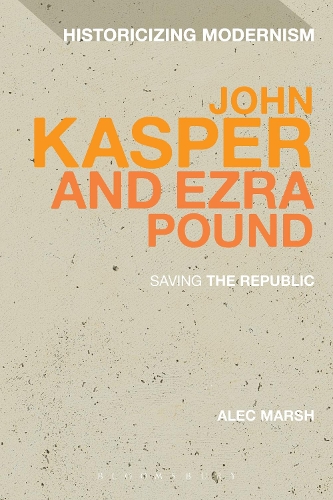
John Kasper and Ezra Pound: Saving the Republic
(Paperback)
Available Formats
Publishing Details
John Kasper and Ezra Pound: Saving the Republic
By (Author) Professor Alec Marsh
Bloomsbury Publishing PLC
Bloomsbury Academic
23rd March 2017
United Kingdom
Classifications
Tertiary Education
Non Fiction
History of the Americas
Literary studies: poetry and poets
811.52
Physical Properties
Paperback
320
Width 156mm, Height 234mm
454g
Description
John Kasper was a militant far-right activist who first came to prominence with his violent campaigns against desegregation in the Civil Rights era. Ezra Pound was the seminal figure in Anglo-American modernist literature and one of the most important poets of the 20th century. This is the first book to comprehensively explore the extensive correspondence - lasting over a decade and numbering hundreds of letters - between the two men. John Kasper and Ezra Pound examines the mutual influence the two men exerted on each other in Pound's later life: how John Kasper developed from a devotee of Pound's poetry to an active right-wing agitator; how Pound's own ideas about race and American politics developed in his discussions with Kasper and how this informed his later poetry. Shedding a disturbing new light on Ezra Pound's committed engagement with extreme right-wing politics in Civil Rights-era America, this is an essential read for students of 20th-century literature.
Reviews
Author of an eponymous biography of Pound (2011) and Money and Modernity (CH, Mar'99, 36-3789)the latter the best book available on Pounds economic ideasMarsh (Muhlenberg College) here demonstrates that John Kasper (an anti-Semitic admirer of Hitler and a segregationist), who has been dismissed by most Pound biographers as a right-wing nut who misunderstood Pounds work, was actually an astute reader of Pound and worked hard to put Pounds ideas into political action. Kasper, whose letters to Pound run to 400 pages, was jailed several times for inciting violent opposition to school integration in the 1950s. Pounds anti-Semitism is well known, but the multiculturalism of his Cantos has obscured the intensity of the racism he learned from Louis Agassiza racism focused on the dangers of racial amalgamation and the resultant decay of racial purity. Marsh shows that Pound endorsed Kaspers activities and agreed that the civil rights struggle was part of a Jewish/communist conspiracy that had infiltrated the US government. Marsh has made an important addition to Pound scholarship. Summing Up: Highly recommended. Upper-division undergraduates and above. -- G. Grieve-Carlson, Lebanon Valley College * CHOICE *
Marsh's study is a vitally important one ... [A] timely and very valuable contribution to the ongoing debate about Pound's politics. * Review of English Studies *
John Kasper and Ezra Pound is a crucial book, not only for the study of a the life and work of Ezra Pound but for those who want to understand the rage of American antigovernment militants ... [Marsh] follows Kasper almost day by day through the late 1950s, and in so doing provides a truly unique portrait of a freelance racist moving through the South as desegregation began. Given this, the book is as valuable as a ground-level study of radical resistance to civil rights, and the sometimes unlikely theories behind that resistance, as it is as a contribution to Pound studies. * Make It New *
Drawing on unpublished documents and the rich correspondence between the two, this volume chronicles the incredible story of [Kasper's] relationship with the poet [Pound]. * La Stampa (Bloomsbury translation) *
The books erudition and exceptionally detailed index are to be commended, and the argument that literary studies of McCarthyism must include consideration of Pound seems impossible to overlook. This sets Marshs work beside important recent work Marshs book not only builds on Pound scholarship but cements the value and rapid development of Bloomsburys Historicizing Modernism series. * This Years Work in English Studies *
Author Bio
Alec Marsh is Professor of English at Muhlenberg College, Pennsylvania, USA. He is the author of Ezra Pound (2011), and Money & Modernity: Pound, Williams and the Spirit of Jefferson (1998).
